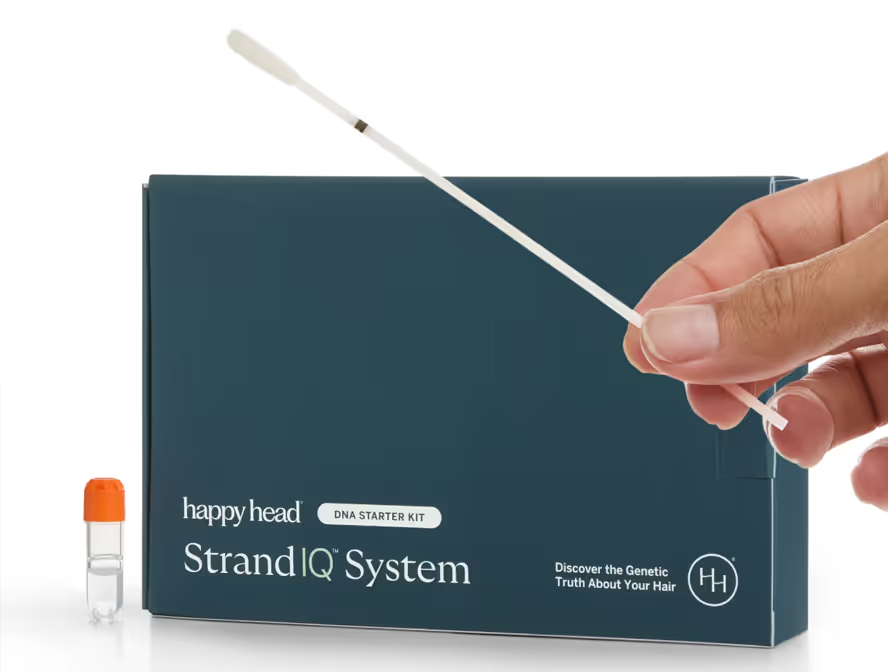When it comes to hair health, there are few minerals more important than zinc. This powerhouse mineral fuels follicle growth, scalp barrier strength, and oil balance. But if your genes reduce zinc absorption, even a healthy diet may not be enough—leading to thinning, slower regrowth, and scalp issues like dandruff.
The truth is that even a borderline zinc deficiency can contribute to hair thinning, slower regrowth, fragility, and scalp irritation.
The Role Genetics Play in Zinc Processing
While low dietary intake can cause zinc deficiency, genetic differences can influence how efficiently your body absorbs, transports, and uses zinc.
Key genetic factors include:
- SLC39A (ZIP) family variants – These genes are responsible for helping to move minerals like zinc into cells. Certain variants may reduce absorption efficiency in the gut or delivery to scalp tissues.
- SLC30A (ZnT) family variants – These transporters help store and distribute zinc within cells. Mutations may impair zinc delivery to hair follicles.
- MT1 and MT2 metallothionein variants – Metallothioneins regulate zinc binding and detoxification of heavy metals. Some variants can alter zinc release to enzymes and scalp tissues.
- Interaction with phytate metabolism genes – Individuals with higher phytate-binding tendencies may absorb less zinc from plant-based foods.
If you carry risk variants, even a zinc-rich diet may not translate into optimal scalp and hair health, making strategic nutrient timing and food pairing important.
Recommendations Based on Genetic Risk
Your optimal zinc strategy depends on your genetics, dietary habits, and other nutrient interactions that can block or enhance absorption.
Low Risk: Maintain Consistent Zinc Intake
If your Happy Head StrandIQ analysis identified you as being at low genetic risk, zinc balance is usually achievable through varied diet and mindful food pairing.
- Include a mix of zinc sources
Seafood like crab and lobster, lean meats, nuts, beans, and whole grains are excellent choices. - Be aware of nutrient competition
Foods high in calcium, iron, or magnesium can interfere with zinc absorption if eaten in large amounts at the same time. - Animal sources are more bioavailable
Zinc from meat is four times easier to absorb than zinc from plants, so balance both sources.
Medium Risk: Optimize Absorption and Diversify Sources
If you’ve been identified as being at a moderate genetic risk, your body may absorb zinc less efficiently, so variety and timing become key.
- Eat zinc-rich foods daily
Include crab, lobster, poultry, beef, chickpeas, lentils, pumpkin seeds, and fortified breakfast cereals. - Separate competing minerals
Avoid taking calcium- or iron-rich foods and supplements at the same time as zinc-rich meals. - Vegetarian or vegan? Boost plant zinc
Soak or sprout beans, grains, and seeds to reduce phytates, which bind zinc. - Fortified foods can help
Many breakfast cereals and plant-based products are fortified with zinc and can help close nutritional gaps. - Consider professional guidance
Your Happy Head care team can help determine if zinc supplementation is necessary.
High Risk: Take a Strategic, Monitored Approach
For individuals whose StrandIQ reports identified them as being at high genetic risk, precision nutrition and possible supplementation may be needed to maintain scalp and hair health.
- Prioritize highly bioavailable zinc sources
Oysters, crab, lobster, beef, lamb, and poultry offer the best absorption rates. - Reduce phytate load
Limit unsoaked legumes and unfermented whole grains that can bind zinc. - Adjust meal timing
Eat zinc-rich meals separately from dairy products, coffee, or tea, which inhibit absorption. - Support cofactors
Adequate protein and vitamin B6 help your body utilize zinc effectively. - Professional monitoring
Have zinc levels tested periodically. Supplementation may be beneficial but should be tailored in partnership with your Happy Head care team to avoid excessive intake, which can cause copper deficiency and immune suppression.
Zinc Deficiency and Hair Loss: The Science
Zinc deficiency is a well-documented contributor to hair loss, particularly telogen effluvium, where hair follicles shift prematurely into the shedding phase. It can also worsen scalp inflammation, making conditions like dandruff and seborrheic dermatitis more severe.
Studies show that zinc supplementation in deficient individuals can reverse some forms of hair loss and improve scalp condition, though results vary based on underlying genetics and overall nutrition.
The Genetic Advantage of Testing
Knowing your genetic profile for zinc metabolism can help you:
- Personalize your diet – Adjust food sources and meal timing based on absorption capacity.
- Prevent long-term damage – Address borderline deficiencies before they affect hair density or scalp health.
- Avoid excess – High zinc intake without need can harm health by depleting copper and weakening immune function.
Genetic testing offers an advantage by highlighting whether absorption, transport, or utilization is your primary challenge, allowing for more targeted intervention.
Final Thoughts
Zinc plays a vital role in hair growth, scalp health, and immune balance. If you’re genetically predisposed to weaker zinc processing, even a nutrient-rich diet might not fully protect your hair and scalp. The key is precision nutrition—pairing the right foods, timing them for optimal absorption, and consulting your Happy Head care team when supplementation may be warranted.
Addressing zinc deficiency early can help protect against thinning hair, slow regrowth, and inflammatory scalp issues—supporting both the health and appearance of your hair for the long term.
Resources
StrandIQ SNP Marker Count: 15
StrandIQ Genes for Trait:
CA1, FNTB, LINC01221, LINC01222, LINC02309, LINC02814, MAX, MIR4778, NBDY, PPCDC, SCAMP5, SLC36A4, SLC39A8, SPIN3, TMOD1
References:
Evans, D.M., et al. (2013). Genome-wide association study identifies loci affecting blood copper, selenium and zinc. Human Molecular Genetics, 22(19), 3998–4006. PMID: 23720494.
Flatby, H.M., et al. (2023). Circulating levels of micronutrients and risk of infections: a Mendelian randomization study. BMC Medicine, 21(1), 84. PMID: 36882828.
Guo, D., et al. (2022). Preliminary study of genome-wide association identifies novel susceptibility genes for serum mineral elements in the Chinese Han population. Biological Trace Element Research, 200(6), 2549–2555. PMID: 34417961.
Kodali, H.P., Pavilonis, B.T., Schooling, C.M. (2018). Effects of copper and zinc on ischemic heart disease and myocardial infarction: a Mendelian randomization study. American Journal of Clinical Nutrition, 108(2), 237–242. PMID: 29982268.
Liu, K., et al. (2024). Genetically determined circulating micronutrients and the risk of nonalcoholic fatty liver disease. Scientific Reports, 14(1), 1105. PMID: 38212362.
Moksnes, M.R., et al. (2024). A genome-wide association study provides insights into the genetic etiology of 57 essential and non-essential trace elements in humans. Communications Biology, 7(1), 432. PMID: 38594418.
Ng, E., et al. (2015). Genome-wide association study of toxic metals and trace elements reveals novel associations. Human Molecular Genetics, 24(16), 4739–4745. PMID: 26025379.
Yang, W., et al. (2022). Genome-wide association and Mendelian randomization study of blood copper levels and 213 deep phenotypes in humans. Communications Biology, 5(1), 405. PMID: 35501403.
Zhou, Y., Wei, Z., Zhan, L., et al. (2024). Causal relationship of serum micronutrient with autoimmune neurological diseases: a Mendelian randomization study. Preprint, posted July 18, 2024. https://www.researchsquare.com/article/rs-4590504/v1
This content, including StrandIQ™ DNA analysis reports and any Happy Head products and/or services referenced therein, is for informational and cosmetic purposes only. It is not intended to diagnose, treat, cure, or prevent any disease. This content does not constitute medical advice and should not be used to make healthcare decisions. References to prescription treatments are educational in nature. Always consult a licensed healthcare professional for any medical concerns or treatment decisions.










.avif)

